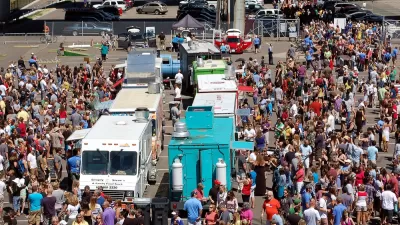In a letter to city officials, a law firm called on the city to lift restrictions on food trucks, saying the ban “smacks of protectionism” and could violate equal protection guarantees.

A nonprofit law firm is warning Denver officials that the city’s ban on food trucks in the Lower Downtown district could be unconstitutional, according to an article by Joe Rubino in the Denver Post. “The Institute for Justice, a Virginia-based, nonprofit law firm, sent a letter to Denver City Council members on Wednesday urging the “repeal” of the ban that bars food trucks from portions LoDo on Thursday, Friday and Saturday nights.” As the article notes, the city clarified that the ban only applies on Friday and Saturday.
“The firm’s lawyers argue the Denver ban ‘smacks of protectionism’ because businesses with permanent storefronts aren’t subject to the same rules. The letter also points to previous Institute for Justice research that indicates food trucks enhance public safety by making streets more inviting and providing more eyes and ears.”
According to the letter, the firm, which has “sued numerous jurisdictions whose laws have impermissibly restricted vendors’ right to economic liberty as guaranteed by the U.S. Constitution and the respective state constitutions,” also works with local governments to “craft vending laws that ensure the public’s health and safety while maximizing opportunities for vendors and consumers alike.”
The Denver Police Department and the Department of Transportation and Infrastructure instituted the ban in July, citing security concerns, but is now considering rolling back the ban “in a limited fashion.”
FULL STORY: Denver’s LoDo food truck ban is likely unconstitutional, law firm warns city leaders

Planetizen Federal Action Tracker
A weekly monitor of how Trump’s orders and actions are impacting planners and planning in America.

Maui's Vacation Rental Debate Turns Ugly
Verbal attacks, misinformation campaigns and fistfights plague a high-stakes debate to convert thousands of vacation rentals into long-term housing.

Restaurant Patios Were a Pandemic Win — Why Were They so Hard to Keep?
Social distancing requirements and changes in travel patterns prompted cities to pilot new uses for street and sidewalk space. Then it got complicated.

In California Battle of Housing vs. Environment, Housing Just Won
A new state law significantly limits the power of CEQA, an environmental review law that served as a powerful tool for blocking new development.

Boulder Eliminates Parking Minimums Citywide
Officials estimate the cost of building a single underground parking space at up to $100,000.

Orange County, Florida Adopts Largest US “Sprawl Repair” Code
The ‘Orange Code’ seeks to rectify decades of sprawl-inducing, car-oriented development.
Urban Design for Planners 1: Software Tools
This six-course series explores essential urban design concepts using open source software and equips planners with the tools they need to participate fully in the urban design process.
Planning for Universal Design
Learn the tools for implementing Universal Design in planning regulations.
Heyer Gruel & Associates PA
JM Goldson LLC
Custer County Colorado
City of Camden Redevelopment Agency
City of Astoria
Transportation Research & Education Center (TREC) at Portland State University
Jefferson Parish Government
Camden Redevelopment Agency
City of Claremont




























